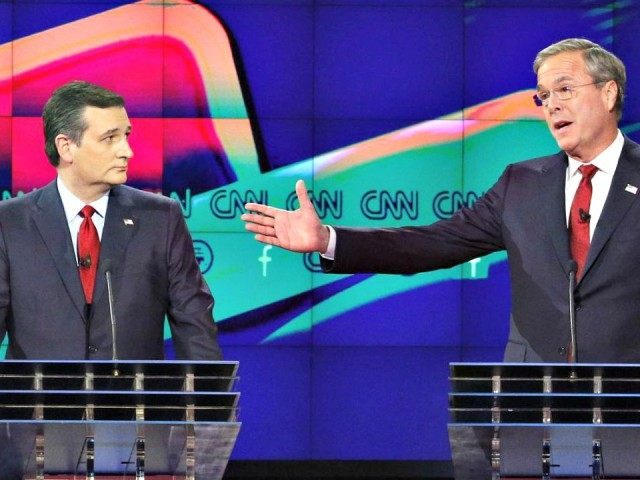AUSTIN, Texas (AP) — Ted Cruz once proudly wore a belt buckle borrowed from George H.W. Bush that said: “President of the United States.”
He campaigned and worked for that former president’s son, Dubya, former President George W. Bush. And Cruz helped write a book lavishing praise on him.
Also, the endorsement of George P. Bush, the family’s latest rising political star and son of Jeb Bush, lent credibility to Cruz’s then little-known 2012 Senate campaign.
Now, though, things aren’t so simpatico between the Bushes and Cruz — and not only because one of the Texas senator’s GOP presidential primary competitors is Jeb Bush, the former governor of Florida.
Rising tensions reflect Cruz potentially helping to dent the Bushes’ position as one of the nation’s pre-eminent political families, personifying a deeper internal Republican Party struggle between insurgent conservative outsiders and the old guard establishment.
“There is this question of, ‘When are the adults going to come in and change the race?’ I think the adults are at the table. I certainly consider myself one,” said Mica Mosbacher, a prominent Cruz fundraiser whose late husband, Robert, was secretary of commerce under George H.W. Bush. “Some people are still in denial.”
Cruz supporters point to October, when George W. Bush said of Cruz to a roomful of donors: “I just don’t like that guy.”
“I think it hurt him,” Mosbacher said of the former president. “He failed to have his finger on the pulse.”
Ray Sullivan, who was national spokesman for George W. Bush’s 2000 campaign, said the comment “underscores a highly competitive, multicandidate race and different segments of the Republican Party.”
But he also conceded that it was somewhat unusual for George W. Bush to openly criticize a fellow Republican.
“The Bushes are a competitive lot,” said Sullivan, who ran a PAC backing Rick Perry’s short-lived 2016 presidential bid before jumping to Jeb Bush’s campaign in September. “I viewed that as almost a game-day, rally-the-troops commentary.”
Cruz hasn’t retaliated, but being criticized by George W. Bush delighted his tea party base. Since then, Cruz’s candidacy has risen in the polls, while Jeb Bush’s bid has struggled.
Clay Johnson III, a friend of George W. Bush since high school and former top budget official in his administration, said he recently spent time with the former president and they discussed how many of the crowded field of GOP White House hopefuls “have no idea at all about what’s involved in being president.”
Still, that public display of bad blood in Bush’s comment to donors was a far cry from Bush’s 2000 presidential campaign, when Cruz was a domestic policy adviser.
Cruz later held jobs in the Bush administration in the Justice Department and Federal Trade Commission and, on the verge of the 2004 Republican National Convention, wrote a chapter in “Thank You, President Bush,” a book meant to answer “Bush-haters.” In it, Cruz likened George W. Bush to Abraham Lincoln and Ronald Reagan and wrote that some fiscal conservatives decried Bush for increased government spending, but “those concerns are often overstated.”
In his own autobiography published last year, however, Cruz made it clear his views had changed, criticizing Bush for excessive federal spending.
Also in his book, Cruz recalled borrowing jeans, a shirt and that belt buckle from George H.W. Bush for a 2009 sailing outing, writing that “it was surreal to be wearing his clothes.”
Before his 2012 Senate bid, Cruz explored running for Texas attorney general. In the autobiography, he detailed how, after the sailing trip, George H.W. Bush agreed to endorse that campaign. But Cruz wrote that Karl Rove, a top strategist for George W. Bush, pressured him not to publicize that.
Rove disputed the book’s assertion last summer, prompting the Cruz campaign to release 2009 emails from Rove that it said backed up Cruz’s account.
Cruz wrote that George H.W. Bush had wanted to call him “the future of the Republican Party.” Three years later, Bush’s grandson, George P., used those same words to praise Cruz during his Senate run.
In a 2012 statement backing Cruz, who was then an underdog in Texas’ Republican primary, George P. Bush saluted him and another now presidential hopeful, Marco Rubio, saying both “will inspire a new generation of leaders to stand up and defend American Exceptionalism.”

COMMENTS
Please let us know if you're having issues with commenting.